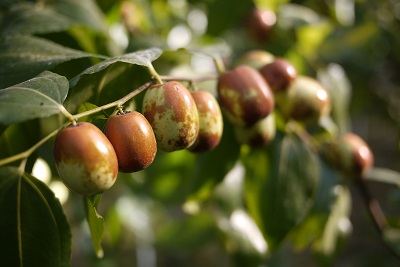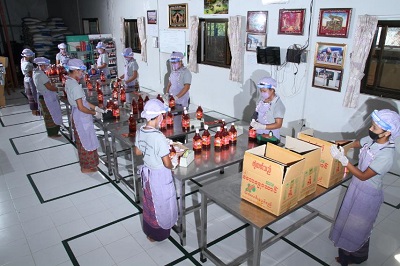A small business making natural products from jujube and tamarind has kept its doors open and workers safe thanks to sustainability principles adopted before the pandemic.
The business challenges posed by the spread of COVID-19 threaten the survival of many companies, especially smaller ones in developing countries.
But Salay Shae Saung, a small business making immune-boosting natural jujube and tamarind syrup in Myanmar, is showing resilience.
It has kept its doors open and workers employed and safe – no factory workers have caught the virus to date – thanks to measures it adopted before the outbreak as part of the BioTrade principles and criteria for the sustainable commerce of plant and animal-based goods and services.
“Measures we put in place before COVID-19, such as new traceability and documentation requirements for our factories and farmers, allowed us to quickly implement the specific hygiene and safety measures required for this virus,” says company owner Aye Aye Naing.
“Since we had already gone through the process of training and informing employees and suppliers of new practices and rules,” she says, “they were better prepared for what our government has asked us to do to help stop the spread of the virus.”

The company, operating in the Chauk Township of the country’s Magway region, has only seen a slight slowdown. Turnover has been around 80% of what was achieved during the same period in 2019.
Though this does mean profits have fallen, the drop hasn’t put the company’s future in jeopardy, which is important for women’s economic empowerment in the township, as 90% of factory employees are female.
“Salay Shae Saung’s story shows that the same guidelines for safeguarding biodiversity can help businesses adapt to shocks such as pandemics,” says Lorena Jaramillo, an UNCTAD economist working on trade and environmental sustainability.
“It also shows that business practices which protect the planet can also improve working conditions,” Ms. Jaramillo adds. “Respect for plants and people go hand-in-hand.”

Red or Chinese date
Besides being turned into healthy juices and syrups, the Jujube tree’s red fruit, commonly known as a red or Chinese date, is a key ingredient in traditional medicines.
It’s just one plant in Southeast Asia being better valorized and protected by sustainable businesses participating in the regional BioTrade project by the Swiss non-governmental organization Helvetas.
The project, which contributes to the global BioTrade initiative spearheaded by UNCTAD, also includes Viet Nam and Laos and receives support from the Swiss State Secretariat for Economic Affairs.
“The region is one of the world’s most important biodiversity hotspots,” says Andrew Wilson, Helvetas’ regional project manager. “These three countries are amongst the most biologically diverse on earth.”
Sales by BioTrade companies and initiatives have steadily increased over the years, from $40 million in 2003 to $6.7 billion in 2019, offering great growth potential for companies like Salay Shae Saung.
“This is particularly true for international high-end markets,” Mr. Wilson says, “where customers are willing to pay a premium for sustainably produced and fairly traded goods.”
Two years of consultations
The BioTrade principles and criteria, which provide a guide for sustainably sourcing, transforming and commercializing goods and services derived from plants and animals, were first introduced in 2007.
They were updated in March 2020, after two years of consultations, to better align them with the United Nation’s 2030 Agenda for Sustainable Development, the Paris climate deal and the Nagoya Protocol on access to natures genetic resources and the fair and equitable sharing of benefits with local populations.
The update also took into account the experiences and lessons learned from partners since the first edition, adding new elements, such as marine biodiversity and sustainable tourism, and updating others, such as worker’s rights, and health and safety.
During BioTrade’s third stakeholders steering committee meeting, held by UNCTAD on 5 May 2020, partners supported the call for the updated principles and criteria to be reflected in the post-2020 global biodiversity framework.
The new framework, which will provide the biodiversity roadmap for the next decade, is expected to be adopted during the 15th Conference of the Parties to the Convention on Biological Diversity, postponed until 2021 due to the challenges of the COVID-19 pandemic.


